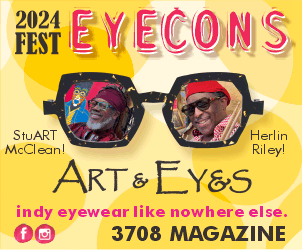Saturday started with the Tipsy Chicks in the Lagniappe Stage. Lynn Drury sang, “All is Forgiven on Frenchmen Street,” and I wonder if that’s true.
In the same Friday T-P story when Quint Davis talked about Jazz Fest being a family-friendly festival, he talked about how important it is to be on time. Unfortunately, neither Wynton Marsalis nor Erykah Badu got the memo; he was 20 minutes late for his interview and she was late for her set. In his interview, Marsalis made the interesting argument that “the definitive national rhythm is swing” – not a position I’m certain I agree with, but one interesting enough to contemplate.
At Congo Square, Ms. Tee’s set was a little run of the mill despite live DJ work on vinyl from EF Cuttin. During the ballad “Too Much to Lose,” I mentioned to a friend that every line in the song had appeared in 20 other songs, but she then surprised me and sang, “I shouldn’t have put the car in my name” and for a moment the song wasn’t simply a by-the-numbers empowerment ballad and the drama seemed real. The relationship between her and her user boyfriend actually existed, and we could understand it. Then she got back to the commonplace lyrics in the chorus and the relationship evaporated.
Was it weird for 5th Ward Weebie to rap “Bend it Over” to his midget dancer?
Paul Sanchez and the Rolling Road Show had the Lagniappe Stage jammed to capacity, and it’s no surprise that the many “Threadheads” in the crowd loved it when he sang, “Be a Threadhead.” The lineup said more to me than the song did – guitars, bass, drums, piano, tuba, trumpet, trombone. With five vocal mics across the front of the stage, his show staged and gave voice to the notion of community that’s implicit in much of the city’s music. His show’s more inclusive than trad jazz or brass bands, though, in that it can include rock (Sonia Tetlow’s punky “Summertime”), gospel (Glen David Andrews’ “Walkin’ Through Heaven’s Gate” and his own psychedelic pop (“Sedation”).
I walked up to Big Sam’s Funky Nation during a bass solo. Nothing brings me down like a bass solo. Over the course of the afternoon, Big Sam’s set became something to chew on as it typified something I’ve been thinking about. It was exciting and energetic, but because everybody played constantly, it didn’t strike me as terribly funky. There are far worse offenders and “funk” bands that offer far less in the way of compensation, but the lack of space I heard was even more noticeable by contrast when Ivan Neville’s Dumpstaphunk followed, leaving big, deep holes in their sound to create not just a groove but funk. Then during Galactic’s set, I wondered about the degree to which this phenomenon can be laid at their feet, but in their case, they also deserve credit for transcending their Meters-y origins and developing a rock-funk hybrid that seems to be pointing the way for some of the more interesting efforts in “funk” these days – Trombone Shorty and Orleans Ave. and, again, Big Sam’s Funky Nation. Obviously, my musings were far more about the state of funk than about Big Sam’s set per se, and the fact that he held my attention enough to stay with the set, start formulating thoughts and contemplate them all afternoon says there’s a lot right going on there – even when the contrasts didn’t favor him.
In the middle of that sequence of funk shows at the Gentilly Stage, I detoured to catch the end of Astral Project, who, apropos of my moment, played a very funky “Sidewalk Strut” with a brief detour in the 1960s-era burlesque club courtesy of Tony Dagradi’s momentarily bar-walking tenor.
Galactic returned from the land of hip-hop for this year’s set, augmented by Shamarr Allen and Corey Henry. They were impressive but not as impressive as their audience, which helped Henry body surf almost halfway to the sound board and back. Galactic crowds eat their Wheaties.
The audience for Wilco looked to be as dense and large as the audience for the Meters reunion in 2005, but it didn’t arrive as early. Actually, the final sets were crowded everywhere I went. Erykah Badu had the Congo Square area packed to the back, and the track was almost closed by the overflow, and the soft rock stylings of James Taylor attracted a massive crowd as well.
I was a little surprised that Wilco didn’t play any new material, but the show seemed tailored to Jazz Fest, playing up the beautiful and rootsy and making the whisper-to-a-squall moments happen less jarringly.
James Taylor played the hits and people sang along. The strangest moment, though – yes, there was a strange moment – when he sang “Steamroller Blues” through the side of his mouth, tightlipped, only partially articulating the words. It made me wonder if he had suffered a stroke that I didn’t know about and hadn’t noticed earlier. But no, the next song and the rest of the set he sang beautifully, so the only conclusion I can draw is that he thinks the way to sound like a blues singer is to pretend you’re palsied.
… and a last thought on Spoon and Friday. A reader at Nola.com said Spoon wasn’t Jazz Fest material. On the surface, I get that, but their songs have the same beautiful, clockwork quality of classic Meters – pieces written in such a way that the omission of any part would cause the song to fail. That doesn’t mean they’re the same as the Meters, but they’re not as far from Jazz Fest aesthetics as it might have seemed at first.




